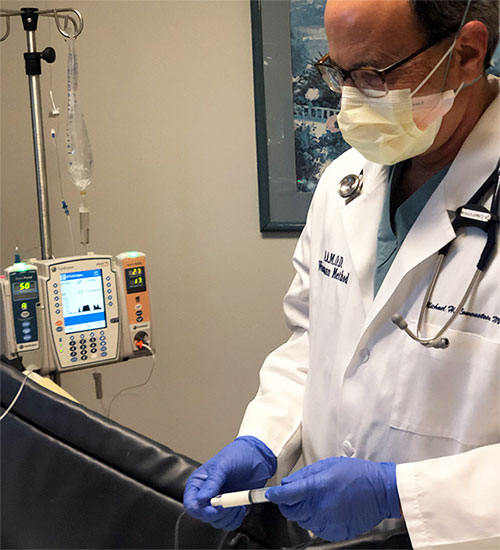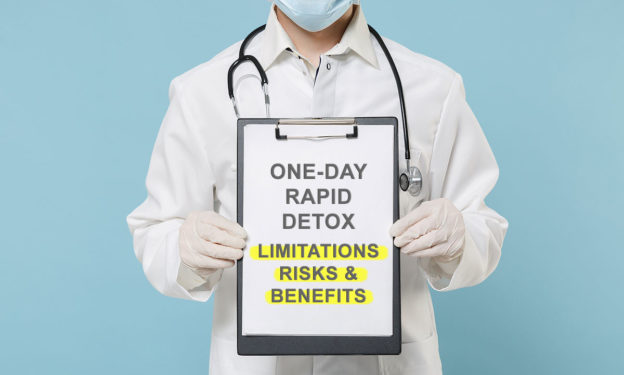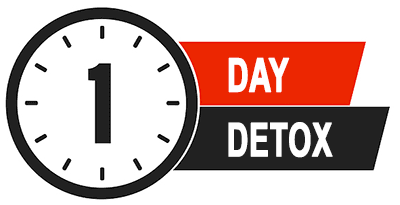What is Rapid Detox?
Rapid detox is an alternative to conventional opioid detoxification methods. But, to answer the question, “how safe is rapid detox?“, it is crucial to realize that although it can be a safe choice for detoxing from opioids, a one-day procedure is fraught with rapid detox risks and dangers.
Done responsibly, rapid detox increases the success rate of patients entering recovery compared to traditional methods. For those grappling with opioid addiction, this can be an attractive treatment option.
Opioid use disorder can lead to a buildup of tolerance and physical dependence, which can culminate in severe withdrawal symptoms. Sadly, drug addiction remains the leading cause of overdose deaths in the U.S.
How Does One-Day Rapid Detox Work?
For over 26 years, people from all over the world have chosen Waismann Method as their opioid detox provider.
We know the challenges you face and the importance of creating a unique and personal experience for you right from the start.Call for Detox Options 1-800-423-2482
One-day rapid detox is a method that many wonder about: “how safe is rapid detox in just one day?”. The truth is, it often doesn’t provide enough time for safe and satisfactory stabilization. All medical practitioners must be acutely aware of the neurobiological and physical impacts of opioid addiction. Promising an overnight solution is misleading and poses severe rapid detox dangers.
Promoting a one-day rapid detoxification or an overnight remedy is medically precarious and ethically questionable. Such procedures should not be endorsed or validated by healthcare professionals, given the pronounced risks relative to any potential advantages.
What Are the Dangers and Risks of 1-Day Detox?
One-day detox processes can lead to:
- Undetected pre-procedure medical issues
- Adverse drug interactions due to unknown substances in the patient’s system
- Insufficient pre-detox evaluations and hydration
- Inadequate post-detox care and support, risking relapse
- Over-sedation and risks of physical injury like falling
- Severe side effects such as continued diarrhea leading to dehydration
These experiences emphasize the need to approach detox responsibly and with ample inpatient time pre and post-detox.
Exploring Opioid Withdrawal Treatment Options
Opioid addiction is daunting due to its strong effects on the brain’s reward mechanisms. Consequently, medically assisted detox options should be readily available.
A clear comprehension of opioid use disorder’s neurobiological and physical effects is paramount for an effective treatment plan.
Patients should always have treatment options tailored to their unique health needs.
Key evaluation factors include:
- Age
- Physical health and current status
- Emotional background
- Current medications and substances
- Social environment
- Duration and method of opioid use
The Misconceptions Surrounding Rapid Detox
The landscape of medical detoxification has been muddled by clinics that not only misuse terms like “rapid” and “accelerated,” but also make audacious claims of restoring patients to a “pre-addiction state.” Biologically, reverting a patient entirely to their state before addiction is an impossibility. By promoting such an idea, these clinics are not only disseminating misleading information but are also operating unethically.
Detoxification under sedation is intricate and demands rigorous medical oversight. Advertising it as a shortcut or a miraculous return to pre-addiction conditions undermines its intricacy and can be detrimental to patients who are led to believe in these exaggerated promises.
Clinics that resort to such advertising techniques prioritize marketing strategies over patient safety and long-term recovery. It’s essential for patients and their families to understand the realities of detoxification and be wary of establishments that offer too-good-to-be-true solutions. True medical professionalism lies in transparency, science-proven practices, and putting patient well-being at the forefront.
Responsible Rapid Detox vs. One-Day Accelerated Detox
What is Responsible Rapid Detox?
Responsible rapid detox is a medically supervised procedure that emphasizes patient safety and well-being. Here are the key characteristics that set it apart:
- Extended Supervision: This method provides detox over several days, allowing medical professionals to monitor reactions and make necessary adjustments.
- Comprehensive Pre-assessment: Before starting the detox, patients are comprehensively evaluated to gauge their medical history, current opioid use, and potential complications.
- Substance Awareness: With the prevalence of illicit fentanyl and other synthetic opioids on the rise, knowing the exact substances and their dosages in a patient’s system is paramount. By giving adequate time to eliminate unknown substances, the chance of negative medication interactions during detox is greatly reduced.
- Hydration and Stabilization: Opioids, by their nature, dehydrate the body. Dehydration can affect the body’s function, slowing processes and causing complications. By ensuring patients are adequately hydrated and stabilized pre-detox, the chances of a successful and safe detox process increase substantially.
- Post-Detox Care: After the detox, there’s a systematic post-care process that includes counseling, therapy, and other support mechanisms to ensure the patient remains off opioids and is equipped to handle potential cravings.
The Risks of One-Day Accelerated Detox
In contrast, one-day accelerated detox is often portrayed as a quick fix solution, but it comes with considerable rapid detox dangers:
- Limited Supervision: The reduced time-frame does not grant medical professionals adequate time to address any complications or adverse reactions.
- Insufficient Assessment: The urgency may lead to an inadequate initial assessment, heightening the risks during detox.
- Compromised Body Readiness: Without sufficient time for hydration and stabilization, the body may not be in the ideal state for detox, increasing the risk of complications.
- Lack of Aftercare: Focusing solely on detox, patients might not receive the required aftercare, amplifying the likelihood of relapse and immediate complications.
Making an Informed Decision

Michael H. Lowenstein, MPH, M.D. – Waismann Method Medical Director and Top Rapid Detox Specialist in the U.S.A.
When considering rapid detox, understanding these approaches’ differences is vital. Responsible rapid detox ensures safety, efficacy, and long-term success, while a one-day accelerated detox might appeal due to its brief duration but carries significant risks and potential long-term drawbacks.
Always prioritize facilities and professionals emphasizing patient care, comprehensive evaluation, and post-detox support when deciding on rapid detox. Such an approach will offer a clearer understanding of “how safe is rapid detox?”, ensuring the selection of the safest rapid detox center.
Rapid detoxification under sedation is a critical medical procedure. Its effectiveness and safety hinge on the integrity, expertise, and diligence of the administering physician.
Conclusion:
Detoxification under anesthesia holds considerable potential as an effective method for addressing opioid addiction. However, like any intricate medical procedure, its success is deeply rooted in the care with which it is administered. Responsible provision of this treatment, paired with ample time allocated both before and after the detox, is paramount to ensure optimal outcomes and patient safety.
Furthermore, the expertise of the administering physician is non-negotiable. A board-certified anesthesiologist, equipped with a wealth of experience, is instrumental in navigating the complexities of this procedure. As a potential patient or a concerned loved one, it is not only your right but also your responsibility to verify the treating doctor’s license, board certification, and track record. Only by entrusting yourself or your loved one to capable hands can you truly harness the potential benefits of detox under anesthesia, ensuring it is not only effective but also safe.
Sources:
- Centers for Disease Control and Prevention (CDC) on Opioids:
- National Institute on Drug Abuse (NIDA):
- World Health Organization (WHO) on Opioid Overdose:
- PubMed (Peer-reviewed journals and articles):
- Substance Abuse and Mental Health Services Administration (SAMHSA):
- American Society of Addiction Medicine (ASAM):
Reviewed by Clare Waismann, a Master Registered Addiction Specialist (M-RAS) and Substance Use Disorder Certified Counselor (SUDCC II). Clare is the esteemed founder of Waismann Method® Advanced Treatment for Opiate Dependence and Domus Retreat®. Recognized as an authoritative figure in opioid dependence, opioid use disorder, substance dependence, and detoxification treatments, Clare Waismann’s expertise extends to detox recovery and various other subjects discussed on RapidDetox.com.








